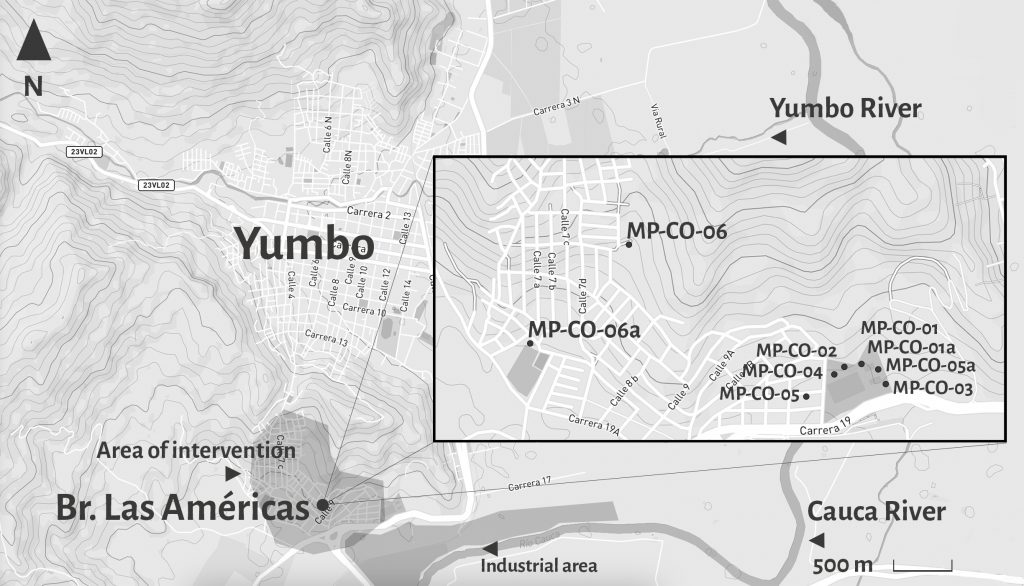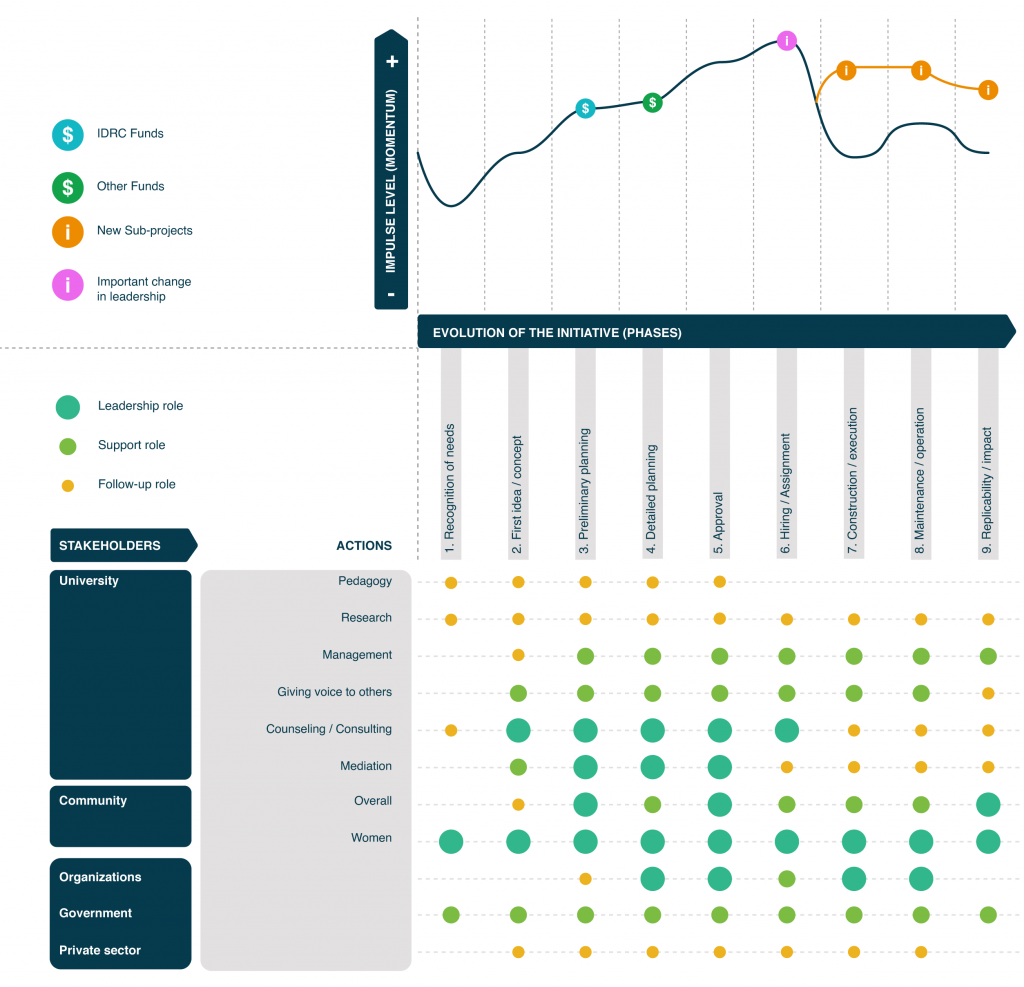Returning to green: From Guabinitas Creek reforestation to home gardening
by Adriana Patricia López-Valencia and Oswaldo López-Bernal. Universidad del Valle. Colombia

[table id=14 /]

Fig. 2. Delivery of kits for the “Famy-Huertas”. 2020. Photo: C. Villa.
Summary
This local initiative, led by environmental organization Fundación FACY, aims to reforest the Guabinitas Creek in the industrial city of Yumbo, Colombia. The area surrounding the stream that flows through Las Américas Park, Laguna de los Patos, and La Estancia Hill is largely deforested due to urbanization and industrial development. The initiative therefore aims to enhance vegetation coverage in a neighbourhood vulnerable to air pollution and the urban island heat effect. Due to restrictions imposed by the COVID-19 pandemic and opposition from newcomers settling in the area, the initiative moved to virtual and home-based garden activities. Twenty-eight families grew trees and plants at home, including vegetables, which are set to later be transplanted near the creek. The initiative not only achieved its initial reforestation objective, but also contributed to the food security of these families at a time of great need and uncertainty. From this experience we learned not to underestimate potential push-back in environmental initiatives, and consequently, to find ways to adapt activities so that they don’t always have to be carried out on-site.
Description
The initiative first aimed to reforest the area surrounding Guabinitas Creek. This creek begins at La Estancia Hill, runs through the Las Américas Park, the Panorama and La Estancia neighbourhoods, and ends in the Laguna de los Patos in Yumbo, Colombia. The creek is, for the most part, deforested and polluted due to informal urbanization and industrial activity. Cement factories, discarded concrete, and old tires have generated polluting emissions in the area. This project, led by local environmental organization Fundación FACY, was meant to be an expansion of the initiative “Reforesting Yumbo.” Its goal was to enhance vegetation coverage in the Las Américas neighbourhood. This residential area severely lacks green coverage and thus requires reforestation. The newly forested park and the edge of the creek will be the only green areas accessible to the residents of this neighbourhood.
The reforestation activities were interrupted when, in 2020, an illegal settlement (occupation) developed in the area. Leaders of this settlement threatened the initiative’s actions for several months. Shortly thereafter, the onset of the pandemic imposed public health restrictions, thus motivating the members of the Fundación FACY to move planting activities to their homes. Participants could take care of the trees at home (which would later be transplanted near the creek), while contributing to the food security of members at a critical time. The participants ultimately harvested 400kg of food, which contributed significantly to feeding 28 households.
The Fundación FACY organized three main activities. First, it offered training to its members on home crops and home gardening using the “Famy-Gardens” approach. This approach was developed by FACY to produce supplies and plants at home that could later be transplanted in public spaces. Second, it planned several urban actions near the creek in Laguna de los Patos and Las Américas Park. These included installing planters made of solid waste, and creating pedestrian trails with specific demarcations and signage. To implement these actions, FACY sought the Universidad del Valle, Community Action Boards, and the Environmental Program of the Municipality of Yumbo’s Ministry of Education for technical advice and community support. Third, the Fundación FACY consulted citizens in the area on the importance of reforestation in the Guabinitas Creek area. The Fundación FACY also participated in other reforestation initiatives in nearby neighbourhoods and contributed to sessions organized by the municipal administration on issues related to the Land Management Plan. These activities helped FACY gain recognition, as well as official certification to continue with the reforestation process beyond the ADAPTO research project timeframe.
Local Implementation and Evolution


The initiative was designed to respond to pre-existing community interest in advancing environmental actions, especially on the part of long-time residents and members of Fundación FACY. In recent years, these residents had advocated for, and indeed started, the reforestation of the Guabinitas sector. ADAPTO provided them the opportunity to scale-up that work. However, the COVID-19 pandemic and the informal settlement of migrant families into the Guabinitas area generated health and safety risks for the initiative’s leaders and participants. Due to these risks, interest and motivitation in the initiative dwindled (stage 6, Fig. 6).
To mitigate the risk, the Fundación FACY decided to delay some of the activities. Leaders and members of FACY were motivated when reforestation activities transitioned to gardening. Many participants had been disillusioned when trees were cut down to make space for informal settlements; indeed, they had invested many years in their reforestation activities. Despite these challenges, they found it was necessary to join in efforts to generate positive actions that would help the work of reforestation continue.
FACY then decided to focus on implementing home gardens that would produce the plants and trees needed to reforest the creek area. It trained 28 families in home gardening, thanks to the support of the National Learning Service SENA (a public institution) and the Yumbo Business Alliance (an alliance of 7 national companies). Although similar to other ADAPTO-funded initiatives in Yumbo, this initiative was distinct given that it focused on the reforestation of Guabinitas specifically. At this stage, the rate of women participants reached 80%, highlighting the work of women in activities related to food sovereignty, household savings, and leadership in the domestic sphere. Also, thanks to the Foundation’s leadership, FACY obtained additional material and human resources from the municipal planning secretariat, the companies belonging to the Yumbo Business Alliance, and the Community Action Boards (governing bodies) of the neighbourhoods surrounding the reforestation area. Thanks to these resources, activities were implemented much more effectively. Finally, in the interest of replicating these activities in other neighbourhoods, FACY held meetings to educate inhabitants of surrounding areas on the dynamics of family gardens.
With this transition, FACY managed to generate a renewal process that now includes advocating for the designation of Guabinitas as a legally protected area. In doing so, FACY aims to avoid future deforestation and to consolidate Guabinitas as a strategic environmental area for the municipality.
Stakeholder participation

The Fundación FACY has led this initiative since its inception in 2019. Despite the challenges faced during implementation, the participation of Fundación FACY members remained stable and strong, with 5 men and 12 women and their families participating in the activities.
In addition to the resources received from ADAPTO to implement the planned activities, FACY connected with public and private actors in order to strengthen the initiative’s impact. This support was mainly material and logistical. The Business Alliance is a group in which several entrepreneurs based in Yumbo meet to carry out social charity activities. It provided resources to expand FACY’s activities. Similarly, the Municipal Planning Office showed great interest in the activities surrounding bodies of water. A national construction company (Melendez) also met with FACY to provide notes on the area. In addition, the organization had the technical support of Universidad del Valle researchers, who consistently accompanied activity implementation. Finally, thanks to the success and popularity of these activities, leaders of the surrounding neighbourhoods of Buenos Aires, Las Américas, San Jorge y Puerto Isaacs added their support.

Results
- Planted 600 trees and plants (including vegetables) in the home gardens of 28 families thanks to the training provided by FACY. These trees and plants will be transplanted near the creek at a later stage.
- Harvested 400 kg of vegetables, contributing to the food security of these 28 households during the pandemic.
- Designed and installed furnishings for public spaces near the creek, including solid waste furniture and planters, and created trails with specific demarcations and signage.
- Installed urban furniture in the areas surrounding the Guabinitas sector during the months of March and April 2021, once the pandemic peaks had passed, using the inputs produced in the Famy-Gardens over the course of the lockdown.
- Advised the municipality of Yumbo’s planning and administration departments on environmental issues, contributing to its 15-year Land Management Plan.
- Engaged and coordinated with the Planning Office, the Community Action Boards of four neighbourhoods, and private entities, to secure additional resources, legal support, and sustained community participation.
- Coordinated strategic actions with external actors, community boards, and foundations, so that the residents could connect directly and indirectly with them during activity implementation.
Lessons learned
The initiative was based on the (perhaps naïve) belief that everyone in the Las Américas neighbourhood wanted the creek area to be reforested. However, we realize that many stakeholders were opposed to the idea. For example, some companies were displeased that attention would be drawn to the environmental damage they have caused in the area. Moreover, the newly-arrived residents want to keep the land on which they have built their homes. We have therefore learned how important it is to consider the social conflicts that may arise from environmental initiatives such as this one.
While community opposition and the COVID-19 pandemic forced on-site activities to stop, these constraints also opened doors to new opportunities. The plants and trees that the members planted in their homes during the pandemic would be transplanted in the Guabinitas area, thus proving that virtual and home-based activities can in fact increase the productivity and effectiveness of reforestation.
Nevertheless, the transition to virtual activities showed the need for new leaders to get involved — especially people who can bring renewed energy to the group, given that most of the participants are older adults. We aim to consolidate and sustain the initiative by replicating it in other neighbourhoods. Bringing more people onboard would give legitimacy to the initiative, provide greater security, and guarantee a future for the process.
Future actions and replicability
The successful adaptation of the Guabinitas recovery project’s activities (from on-site to virtual modalities) demonstrated that it is possible to implement activities inside and outside the planned intervention space. It follows that similar proposals can be made for lasting and replicable interventions in other urban spaces. The initiative also made it possible for the Fundación FACY’s work to gain in popularity and recognition.
Their work has the capacity to go beyond Guabinitas and engage other neighbourhoods in environmental improvement exercises. In fact, similar actions are being implemented by people from other neighbourhoods thanks to the FACY team’s articulations with other community leaders in the area.
Finally, there is certainly great interest in continuing to carry out environmental and awareness-raising activities. ADAPTO’s lessons and support, FACY’s leadership in implementation, and the collaboration between FACY and the private sector (with the latter continuing to provide support) would be essential to the implementation of future projects. FACY is currently working to ensure that the area is declared a protected area of environmental interest for the municipality.
References
- ECHEVERRY, L. (2018). Entre el verde y el gris: Un llamado a detenerse en el camino para apreciar con atención el mensaje poético del paisaje, que precisa equilibrio. Revista Universitas Científica, 26-31.
- COMISIÓN EUROPEA. (2014). Una Guía para Apoyar la Elección, el Diseño y la Implementación de las Medidas Naturales de Retención de Agua en Europa. Bruselas: COMISIÓN EUROPEA Dirección General de Medio Ambiente Dirección C — Calidad de vida, agua y aire.
- FERNÁNDEZ, N. G., y RUIZ, A. S. (2014). Infraestructura verde urbana: Plan Estratégico de Desarrollo Urbano de Makeni (Sierra Leona). Recuperado el 18 de 5 de 2019, de http://oa.upm.es/38664


